Contents
Weigela Nana Purpurea is an ornamental plant valued for its abundant flowering. The shrub is propagated by seeds or cuttings. For its successful cultivation, a suitable place is required. During the growing season, the flower garden is provided with care.
Description of weigela Nana Purpurea
The natural form of flowering weigela is found in the Primorsky region, in northern China and in Japan. It is a bush up to 3 m high with numerous bright pink flowers.
Blooming weigela, or Weigela Florida Nana Purpurea, is a low perennial shrub. An adult plant reaches 0,7 – 1,5 m. The shrub grows slowly. As a result, a compact rounded crown is formed. In width, an adult bush reaches 2 m.
The variety Nana Purpurea has oval, short-leaved leaves. Young foliage is red-brown and turns green as the season progresses. Due to this, the bush has a decorative appearance at any time of the year. Every year it gives an increase of 15 cm.
Variety Nana Purpurea has an average frost resistance. Plants freeze slightly without shelter in the middle lane. However, the bushes quickly grow the crown, which becomes more compact. In this case, the flowering period is postponed to mid-summer.
How weigela Nana Purpurea blooms
Judging by the photo and description, weigela Nana Purpurea produces dark pink tubular flowers. The inner central part of their yellow coloration. The length of each flower is up to 5 cm and a diameter of 2 – 5 cm. They are formed in inflorescences of 3 – 5 pieces.
The buds open in late May or early June. Flowering continues until the end of next month. In early autumn, the reappearance of inflorescences is possible. Weigela is a good honey plant that attracts bees and other pollinators.
Weigela purple in the photo:
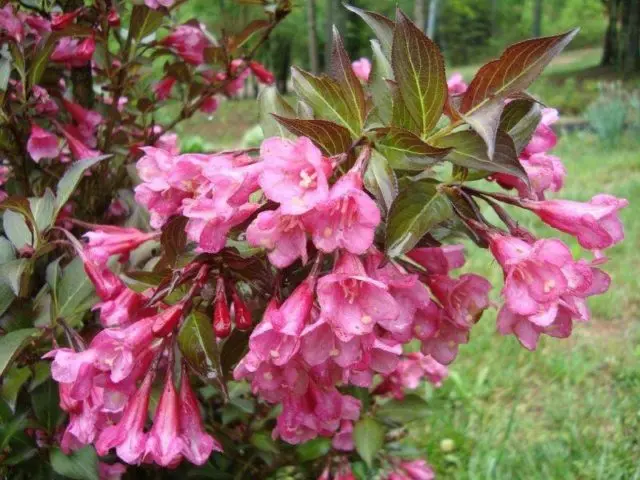
The use of weigela Nana Purpurea in landscape design
Weigela looks good in single and group compositions. A bright shrub stands out against the background of a green lawn, as well as on the edges or under separately located trees. Its decorative properties are used to decorate paths and create hedges.
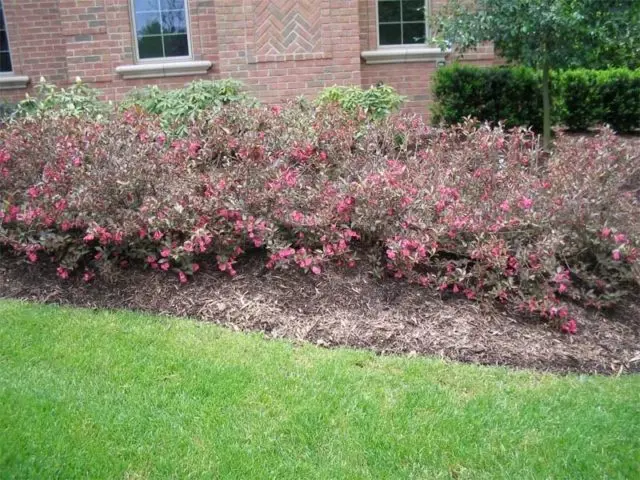
In group plantings, shrubs are combined with shade-tolerant perennials. This includes fern, hosta, astilba, which adorn the garden throughout the season. The shrub looks advantageous against the background of evergreens: juniper, arborvitae, cypress.
When choosing plants for planting next to the weigela, the timing of flowering, the color of the leaves and petals, the shape and size of the bushes are taken into account. The most harmonious are combinations with barberry, spirea, Japanese quince, viburnum.
How weigela Nana Purple reproduces
Weigela is propagated by seeds or cuttings. In the first case, fresh material collected last season is taken. Seeds remain viable throughout the year. They are planted in containers filled with fertile soil. Seed material germinates well without prior preparation. When the seedlings grow up, they are seated in separate containers. Plants are transferred to open ground at the age of 3 years. Flowering shrub begins in the 4th year.
When weigela Nana Purpurea is propagated by seeds, the resulting seedlings may lose varietal characteristics. Therefore, cuttings are most often used. On the bush, young, half-buried shoots are selected. Then the leaves are cut off on them and placed in water for 2 hours. Treatment with a growth stimulator helps to improve the survival rate of cuttings. At the end of June, the shoots are placed in a container with peat and sand. Almost all cuttings root successfully.
In the photo, a young weigela shrub Nana Purpurea:
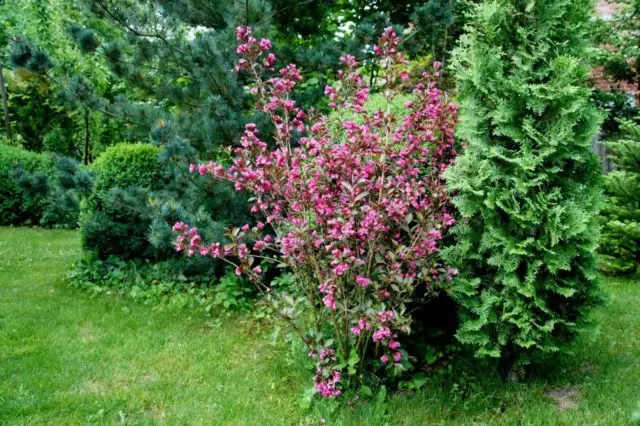
Planting and caring for weigela Nana Purpurea
For the successful cultivation of blooming weigela Nana Purpurea, they follow the rules of planting and care. For landing, choose the best place and a certain period. Then proceed to the preparation of the soil and seedlings. The development of the shrub provides constant care.
Recommended timing
Weigela Nana Purpurea is planted in the spring when the soil warms up well. Depending on the region, this is April – May. Three-year-old plants are chosen for planting. If the seedlings are bought in the fall, then they are buried in the soil in an inclined position. Sawdust, peat or humus are poured on top.
Site selection and preparation of soil
Variety Nana Purpurea prefers sunny areas. It is allowed to land in partial shade under large trees with a sparse crown or shrubs. With a lack of sunlight, the leaves lose their unusual color, and fewer inflorescences form.
The shoots and flowers of the plant can break under the influence of wind. Therefore, it is planted in protected places: next to fences, trees, buildings.
Weigela Nana Purpurea is demanding on the ground. The substrate is obtained from humus, sand and sod land. They are taken in a ratio of 2:2:1. Best of all, the shrub develops on fresh soils that pass moisture and air well. Weigela does not tolerate stagnant moisture, so coarse sand is added to heavy soil and a drainage layer is made.
How to plant
The order of planting weigela variety Nana Purpurea:
- On the site, they dig a hole measuring 50×50 cm to a depth of 60 cm.
- Drainage is poured at the bottom of gravel and sand 15 cm thick.
- A substrate is placed in the pit, consisting of leafy soil, sand and compost.
- The seedling is taken out of the container, its roots are straightened and placed in a hole. The root neck is not deepened.
- Weigela roots are covered with earth.
- The plant is watered abundantly.
Growing rules
When growing the Nana Purpurea variety, special attention is paid to care. The shrub needs watering, top dressing and crown formation. Preparatory measures will help the plant to better endure the winter.
Watering
The Nana Purpurea shrub is watered in early spring if the weather is dry or in winter when there is little snow. An adult bush requires 8 – 10 liters of water. During the season, moisture is added as the soil dries.
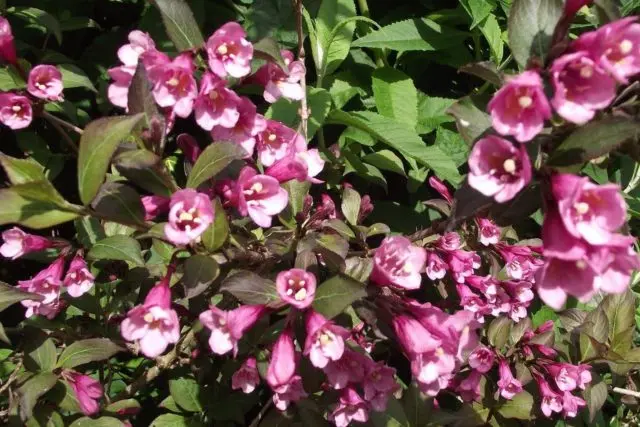
Additional fertilizing
According to Weigel reviews, Nana Purpurea responds positively to top dressing. In the spring, a mineral mixture is poured onto the snow: 25 g of urea, 10 g of viburnum salt and superphosphate. Fertilizer will help plants recover from the winter cold. The next top dressing is carried out in June, when the buds are formed. For 1 sq. m requires 30 g of phosphorus and potash fertilizers.
Loosening, mulching
After watering the Nana Purpurea variety, the trunk circle is loosened. The soil is cleared of weeds. The optimum loosening depth is up to 8 cm. For mulching, sawdust is used with a layer of up to 10 cm: this way moisture is retained in the soil longer and the growth of weeds slows down.
Pruning, crown formation
Blooming weigela Nana Purpurea is pruned every 2 to 3 years. Weigela grows slowly, so the procedure is not carried out as often as for other shrubs. Choose the period when flowering ends. To rejuvenate the bush, branches older than 3 years are cut, the rest are shortened by 1/3 of the length. Dry and frozen shoots are removed annually.
Preparation for winter
In autumn, the Nana Purpurea variety is prepared for wintering. Until the soil freezes, the bush is watered abundantly. Then the shoots are tied and laid on the ground. Peat or humus is poured into the trunk circle. A frame is installed on top and lutrosil or other non-woven material is attached. In the spring, after the snow melts, the shelter is removed.
Pests and diseases
The greatest danger to weigela is aphid. To combat the pest, a solution of the drug Iskra or Karbofos is prepared. Folk remedies help well: an infusion of garlic or ground pepper.
With high humidity, the Nana Purpurea variety suffers from gray rot, rust and spotting. Diseases are caused by fungal spores that spread throughout the plant. If signs of a disease are found, the shrub is sprayed with Bordeaux liquid or a solution of copper oxychloride. The treatment is repeated after 1 – 2 weeks.
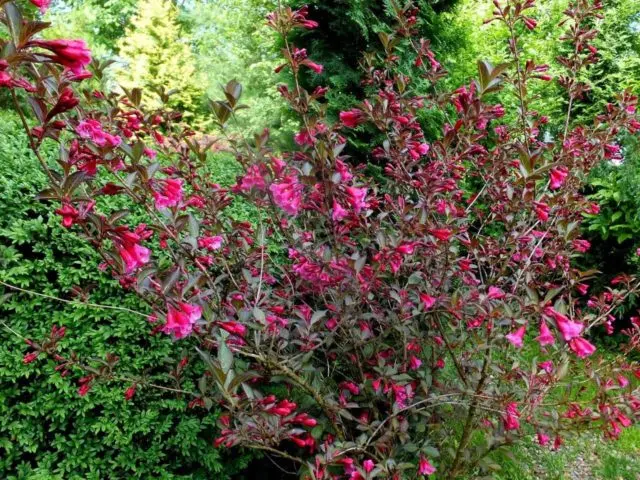
Conclusion
Weigela Nana Purpurea is an unpretentious shrub with decorative properties. It is planted in autumn or spring. Before planting, prepare a landing pit and a nutrient substrate. The plant requires minimal care: watering, top dressing, pruning, preparation for wintering.









